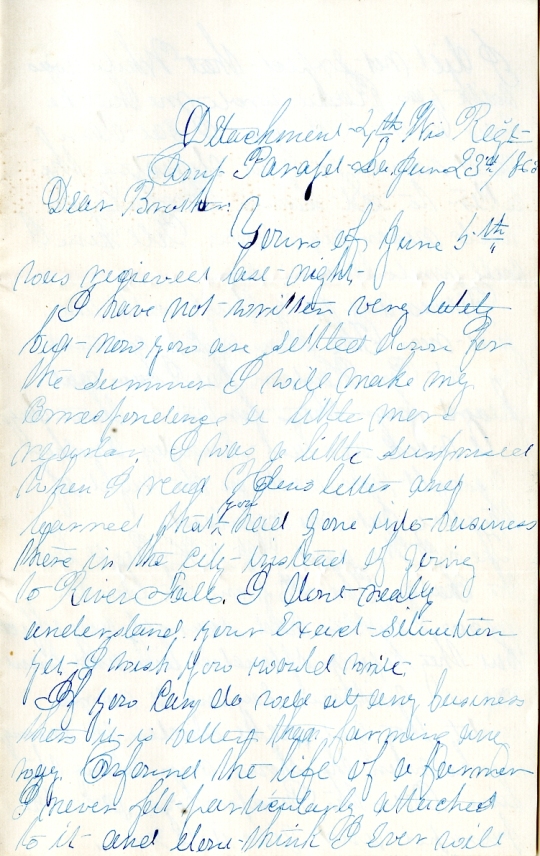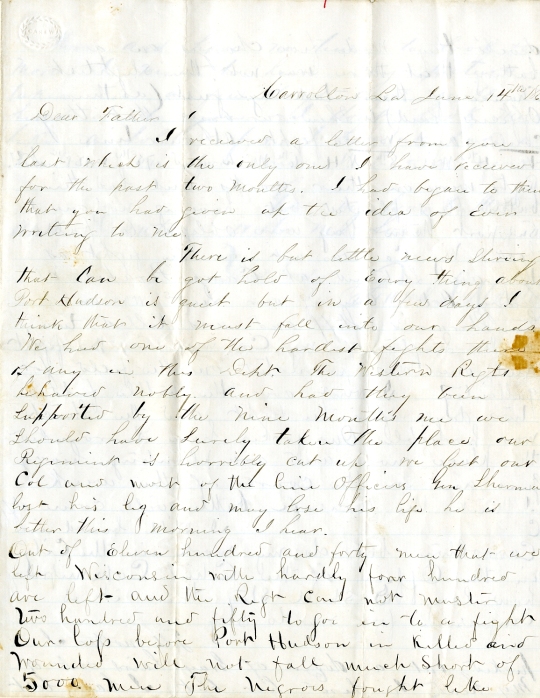Jerry Flint was in Company G of the 4th Wisconsin Infantry. Company G was “stuck” on artillery duty, so did not participate in the action at Port Hudson that Jerry describes here. The original letter is in the Jerry E. Flint Papers (River Falls Mss BN) at the University of Wisconsin-River Falls, University Archives and Area Research Center.
Detachment 4th Wis Regt
Camp Parapet La June 23d /863
Dear Brother;
Yours of June 5th was recieved [sic] last night.
I have not written very lately but now you are settled down for the summer I will make my correspondence a little more regular. I was a little surprised when I read Helen’s letter and learned that you had gone into business there in the city instead of going to River Falls. I don’t really understand your exact situation yet. I wish you would write. If you can do well at any business there it is better than farming any way. Confound the life of a farmer. I never felt particularly attached to it and don’t think I ever will.
I did not expect that White¹ was with you. Rossie² wrote me that he was in the 20th Reg. I sat down and wrote to him directing the letter to St. Louis. Probably he will never get it now. Tell him I will write to him soon.
Times are very dull with me just now. The scene of excitement is at Port Hudson, but I have not heard from there for two or three days. A week ago last Sunday another assault was made on the right of the line but was repulsed. The 4th Wis. and 8th N.H. Regts led the charge. The 4th from the loss in previous battles had scarcely any officers but they kept a splendid line and went one on without saying a word until they got right under the enemy works, when the shout ran along the line, “Over the Parapet boys,” “over the parapet and give it to ’em.” And over the parapet they went although their men were falling thick and fast. If the support had come up instead of running like cowards as they were that stronghold would have been ours to-day. These regiments were the 21st Mass. and 133rd N.Y. They were not orderdered [sic] forward until the two first mentioned Reg. were scaling the works and consequently receiving nearly all the rebel fire thus rendering it comparatively safe for the other troops to advance. They however did lay down in a hollow and refused to go forward. At this time Gen. Paine [Halbert E. Paine] rode to the front and not only ordered them forward but fairly entreated them to go. But it was of no use, they broke and ran to the rear, thereby causing the slaughter of hundreds of the brave men who had volunteered to clear the way for them. At this time Paine was severly wounded in the leg. It is not certain yet whether he will recover or not. Out of 230 men of our regiment who went into the charge only 50 came back and part of them were slightly wounded.³
The two regiments that run use nine month men. Their time is so neer [sic] up they think it a pity for them to get killed. Cowardly fools they ought to be set up as targets for the old troops to shoot at, only we it would be a pity to waste power and lead on them. I hate a nine months man worse than the devil. [paragraph break added]
Well my sheet is most full and I have not written much either. I think you will be glad to hear me stop. Give my love to Mother. I wish I could see her although it is useless to wish for the thing is impossible.
Jerry E. Flint
1. Jerry is probably talking about Henry J. White, who had been with Jerry’s company (G) and then in the 4th Wisconsin Infantry’s band, but had mustered out on September 18, 1862.
2. Rossie is Jerry’s cousin Roswell V. Pratt.
3. The following account is from E. B. Quiner’s Military History of Wisconsin (Chicago: 1866), chapter 14, page 505-506 (UWRF Archives E 537 .Q56 1866; available digitally on the Wisconsin Historical Society’s website).
“On the 4th of June, another assault on the enemy’s works at Port Hudson was made. General Paine’s division occupied the centre. The Fourth Wisconsin and 8th New Hampshire were placed in the advance as skirmishers. They were to be followed by three Massachusetts regiments, with hand grenades to throw into the enemy’s works, and bags of cotton to fill the ditch, to enable the infantry to charge up to the enemy’s works. The assault was covered by a heavy artillery fire. The skirmishers dashed up to the rebel works, on the double quick, the enemy all the time pouring in a terrible fire. men were falling at every step, but those unhurt passed gallantly on, until they reached the breastworks, and attempted to scale them, some went over, either dead or prisoners; most fell under the works, killed or wounded. The few that were left, sought protection behind stumps and swells of ground. The supports, seeing the fate of the skirmishers, refused to go forward. While urging on these men to the support of those in advance, General Paine was struck by a rifle bullet, in the leg, just after daylight, and fell among a large number of dead and wounded, about fifteen rods from the enemy’s works. The slight ridges of the field, which had formerly been cultivated, protected him from the fire of the enemy, which broke out with great fury whenever the intolerable heat compelled him to move. Efforts were made to rescue him, but the rebel fire prevented it. A private of the One Hundred and Thirty-third New York, named Patrick Cohen, tossed him a canteen of water, taken from a dead soldier, which General Paine thinks saved his life. At night he was removed, and subsequently was sent to the Hotel Dieu, in New Orleans, where his leg was amputated. … [Here, on page 506, is the lengthy list of killed, wounded, and missing.]
“The regiment went into action with 220 men. Many of the missing were captured inside the fort, having jumped over the works, under the idea that they were to be followed by their supports. Many of those captured succeeded in escaping before the capitulation.”

